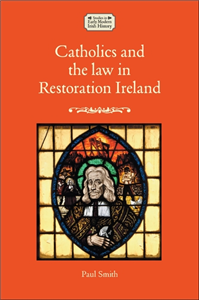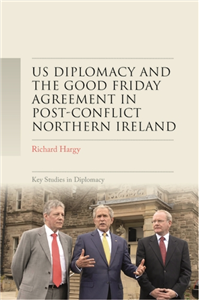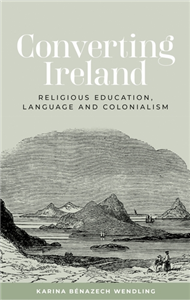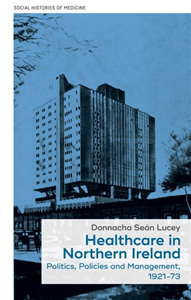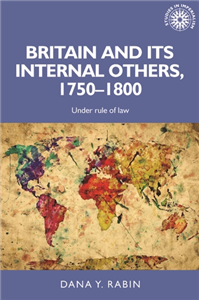Your Search Results
-
Promoted Content
-
Promoted Content
-
 Trusted Partner
Humanities & Social SciencesOctober 2021
Trusted Partner
Humanities & Social SciencesOctober 2021Ireland and the European Union
Economic, political and social crises
by Michael Holmes, Kathryn Simpson, Dimitris Papadimitriou, Kathryn Simpson, Paul Tobin
This book examines how Ireland's relationship with the EU was affected by a succession of crises in both the Republic of Ireland and Northern Ireland. The financial crisis, the Brexit crisis and the migration crisis were not of equal significance on the island of Ireland. The financial crisis was a huge issue for the Republic but not Northern Ireland, Brexit had a major impact in both polities, the migration and populism issues were less controversial, while foreign policy challenges had a minimal impact. The book provides a summary of the main features of each of the crises to be considered, from both the EU and the Irish perspective. Ireland and the European Union is the first volume of its kind to provide a comprehensive analysis on British-Irish relations in the context of Brexit. It assesses the Withdrawal Agreement and Protocol on Ireland/Northern Ireland, the devolution settlement and the 1998 Agreement, as well as the European dimension to Northern Ireland's peace process. The contributors explore a number of policy areas that are central to the understanding of each of the crises and the impact of each for Ireland. Chapters examine issues such as security, migration and taxation as well as protest politics, political parties, the media, public opinion and the economic impact of each of these crises on Ireland's relationship with the EU.
-
 Trusted Partner
Humanities & Social SciencesJanuary 2025
Trusted Partner
Humanities & Social SciencesJanuary 2025Catholics and the law in Restoration Ireland
by Paul Smith
In 1660 Charles II was restored to the thrones of England, Scotland and Ireland, but his hold on power was precarious. In particular, Ireland was fundamentally unstable - Catholics formed the majority of the population in a country where Protestantism was the established religion, a state of affairs unique in Europe. It was through the law that the restored Stuart monarchy governed its subjects and its colonial dependencies, and this book examines how Catholics engaged with and experienced English common law primarily through the eyes of Catholic clerics and Gaelic poets. It also examines how Catholics engaged with the Courts and the particular challenges they faced as lawyers. The book draws on an extensive body of primary source materials, including Irish-language poetry and little-used archival material relating to elite Catholic families.
-
 Trusted Partner
Teaching, Language & ReferenceMay 2025
Trusted Partner
Teaching, Language & ReferenceMay 2025US diplomacy and the Good Friday Agreement in post-conflict Northern Ireland
by Richard Hargy
Richard Haass and Mitchell Reiss, as autonomous diplomats in the George W. Bush State Department, were able to alter US intervention in Northern Ireland and play critical roles in the post-1998 peace process. Their contributions have not been fully appreciated or understood. The restoration of Northern Ireland's power-sharing government in 2007 was made possible by State Department-led intervention in the peace process. There are few references to Northern Ireland in work examining the foreign policy legacy of the George W. Bush presidency. Moreover, the ability to control US foreign policy towards the region brought one of George W. Bush's Northern Ireland special envoys into direct diplomatic conflict with the most senior actors inside the British government. This book will uncover the extent of this fall-out and provide original accounts on how diplomatic relations between these old allies became so fraught.
-
 Trusted Partner
Trusted Partner
-
 Trusted Partner
Trusted Partner
-
 Trusted Partner
Trusted Partner
-
 Trusted Partner
Trusted Partner
-
 Trusted Partner
Humanities & Social SciencesApril 2026
Trusted Partner
Humanities & Social SciencesApril 2026Converting Ireland
Religious education, language and colonialism
by Karina Bénazech Wendling
Karina Bénazech Wendling offers a re-assessment of 'souperism'-the long-debated claim that food was used to convert Irish Catholics to Protestantism during the Great Famine. Focusing on the Irish Society for Promoting the Education of the Native Irish through their Own Language, the first group labeled 'soupers' in 1841, she uncovers a more complex picture. Rather than a mere tool of British cultural imperialism, the Society had a deep engagement with the Irish language and Bible translation, while also encouraging religious conversions in the West. The book explores the Society's role in Ireland's religious and political landscape, the rise of Catholic counter-missions, and nationalist resistance. Offering fresh insights into Ireland's religious history and global missionary movements, this book is essential for scholars of Irish studies, interdenominational relations, and education in Ireland.
-
 Trusted Partner
Humanities & Social SciencesOctober 2021
Trusted Partner
Humanities & Social SciencesOctober 2021Ireland and the European Union
by Michael Holmes, Kathryn Simpson
-
 Trusted Partner
Humanities & Social SciencesSeptember 2024
Trusted Partner
Humanities & Social SciencesSeptember 2024Ireland, slavery and the Caribbean
Interdisciplinary perspectives
by Finola O'Kane, Ciarán O'Neill
Ireland, slavery and the Caribbean is a complex and ground-breaking collection of essays. Grounded in history, it integrates perspectives from art historians, architectural and landscape historians, and literary scholars to produce a genuinely interdisciplinary collection that spans from 1620-1830: the high point of European colonialism. By exploring imperial, national and familial relationships from their building blocks of plantation, migration, property and trade, it finds new ways to re-create and question how slavery made the Atlantic world.
-
 Trusted Partner
Humanities & Social SciencesSeptember 2009
Trusted Partner
Humanities & Social SciencesSeptember 2009Transforming Ireland
Challenges, critiques, resources
by Debbie Ging, Michael Cronin, Peadar Kirby
This is the first sustained and broad-ranging critique of the legacies of Ireland's Celtic Tiger boom. Contributors identify the damaging impact that the free market has had on a wide range of areas in public life, including the media and the pharmaceutical industry, and also examine its influence on health, education, state surveillance, immigrants, the welfare state, consumerism and the Irish language. Challenging the notion that there is no alternative for Ireland but the present economic and political dispensation, experts map out an alternative politics that could create spaces for hope and renewal in contemporary Ireland. In a society whose public debates have been largely dominated by the instrumentalist logic of stockbroker economists and the regressive populism of talk-radio shock jocks, Transforming Ireland offers a more substantial and considered analysis, uncovering hidden aspects of everyday Irish life. It reveals that, virtually unnoticed by the media, there exist lively debates in today's Ireland which draw on international insights about globalisation to probe how it is reshaping Irish society. Covering four principal topics - culture and society, media and social change, social control, and power and politics - this impressive volume opens new and hopeful perspectives for students and also the general reader. Though primarily a book about Ireland, it is also a book about today's form of globalisation, offering a rare and accessible analysis of the damage done to society when market forces are given free rein. ;
-
 Trusted Partner
Trusted Partner
-
 Trusted Partner
MedicineMarch 2026
Trusted Partner
MedicineMarch 2026Healthcare in Northern Ireland
Politics, Policies and Management, 1921-72
by Donnacha Lucey
-
 Trusted Partner
Humanities & Social SciencesMarch 2017
Trusted Partner
Humanities & Social SciencesMarch 2017Britain in China
by Robert Bickers
This is a study of Britain's presence in China both at its peak, and during its inter-war dissolution in the face of assertive Chinese nationalism and declining British diplomatic support. Using archival materials from China and records in Britain and the United States, the author paints a portrait of the traders, missionaries, businessmen, diplomats and settlers who constituted "Britain-in-China", challenging our understanding of British imperialism there. Bickers argues that the British presence in China was dominated by urban settlers whose primary allegiance lay not with any grand imperial design, but with their own communities and precarious livelihoods. This brought them into conflict not only with the Chinese population, but with the British imperial government. The book also analyzes the formation and maintenance of settler identities, and then investigates how the British state and its allies brought an end to the reign of freelance, settler imperialism on the China coast. At the same time, other British sectors, missionary and business, renegotiated their own relationship with their Chinese markets and the Chinese state and distanced themselves from the settler British.
-
 Trusted Partner
Trusted Partner
-
 Trusted Partner
Humanities & Social SciencesMarch 2017
Trusted Partner
Humanities & Social SciencesMarch 2017Sunningdale, the Ulster Workers' Council strike and the struggle for democracy in Northern Ireland
by David McCann, Cillian McGrattan
-
 Trusted Partner
Humanities & Social SciencesAugust 2022
Trusted Partner
Humanities & Social SciencesAugust 2022Britain and its internal others, 1750–1800
Under rule of law
by Dana Rabin
The rule of law, an ideology of equality and universality that justified Britain's eighteenth-century imperial claims, was the product not of abstract principles but imperial contact. As the Empire expanded, encompassing greater religious, ethnic and racial diversity, the law paradoxically contained and maintained these very differences. This book revisits six notorious incidents that occasioned vigorous debate in London's courtrooms, streets and presses: the Jewish Naturalization Act and the Elizabeth Canning case (1753-54); the Somerset Case (1771-72); the Gordon Riots (1780); the mutinies of 1797; and Union with Ireland (1800). Each of these cases adjudicated the presence of outsiders in London - from Jews and Gypsies to Africans and Catholics. The demands of these internal others to equality before the law drew them into the legal system, challenging longstanding notions of English identity and exposing contradictions in the rule of law.
-
 Trusted Partner
March 2012
Trusted Partner
March 2012The ends of Ireland
Criticism, history, subjectivity
by Conor Carville
'The Ends of Ireland' considers the work of a key group of critics emerging from Ireland through the 1980s and 1990s: Seamus Deane, Luke Gibbons, David Lloyd, W. J. McCormack, Gerardine Meaney and Emer Nolan. As the main representatives of the turn to theory in Irish Studies these critics have examined Irish culture in the light of ideas taken from psychoanalysis, feminism, Marxism and postcolonialism. In a series of incisive yet accessible chapters Carville analyses the way in which these often provocative ideas have been put to work in the Irish context, transforming our understanding of writers like Joyce and Beckett, as well as informing broader debates around nationalism, modernization, memory and historical revisionism. Essential reading for anyone concerned with Irish Studies and its relationship with theory, the issues raised by 'The Ends of Ireland' set a new agenda for Irish Studies in the coming times. ;






